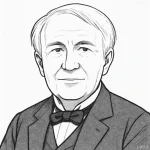“I wasted time, and now doth time waste me.”

- April 26, 1564 – April 23, 1616
- Born in England
- Playwright, poet, actor
table of contents
Quote
“I wasted time, and now doth time waste me.”
Explanation
This quote from Shakespeare’s Richard II reflects the consequences of squandering time and the inevitable regret that follows. The speaker, King Richard, recognizes that he spent his time carelessly or ineffectively, and now, as a result, time itself is working against him—either by causing his downfall or by running out. “I wasted time” acknowledges the personal failure to use time wisely, while “now doth time waste me” suggests that the passage of time has caught up with him, leaving him with fewer opportunities or less control over his fate. This creates a sense of inevitability and loss, as the consequences of his actions (or inactions) become clearer.
In modern contexts, this quote serves as a warning about time management and the importance of using one’s time wisely. Whether in personal goals, career pursuits, or relationships, the idea that time, once wasted, can never be reclaimed is a reminder to live with intentionality and purpose. Many people, looking back on their lives, may feel the regret of missed opportunities and realize that the time they had is no longer available to them.
Ultimately, the quote emphasizes the preciousness of time and the need to make conscious choices about how we spend it. It calls attention to the long-term consequences of procrastination or failing to act, urging us to recognize that time is finite and must be used wisely before it is too late.
Would you like to share your impressions or related stories about this quote in the comments section?




